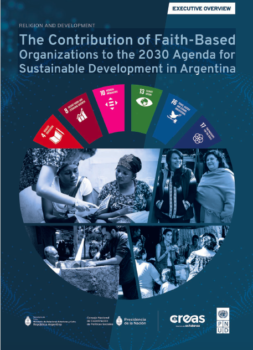 A new report on the role of faith-based organisations in achieving the Agenda 2030 was released this week by UNDP and ACT Member Creas with the support of the the Government of Argentina. According to “The contribution of faith-based organisations to the 2030 Agenda for sustainable development in Argentina”, it is clear that governments cannot achieve the SDGs unless they are able to establish active partnerships with civil society.
A new report on the role of faith-based organisations in achieving the Agenda 2030 was released this week by UNDP and ACT Member Creas with the support of the the Government of Argentina. According to “The contribution of faith-based organisations to the 2030 Agenda for sustainable development in Argentina”, it is clear that governments cannot achieve the SDGs unless they are able to establish active partnerships with civil society.
ACT Alliance concerned by civilians at risk in North East Syria
Civilians at risk in North East Syria
ACT Alliance is concerned by the desperate situation of the thousands of civilians in northeast Syria whose safety has been put at risk by the launch of the Turkish military offensive.
Civilians have already been displaced and some vital services have been interrupted, including medical facilities and water supplies. ACT Members and their partners working in the area are concerned by the news that agencies report staff fleeing with their families, while others are on lockdown.
An estimated 450,000 people live within 5km of the Syria-Turkey border and are at risk if all sides do not exercise maximum restraint and prioritise the protection of civilians. According to the latest estimates[1] nearly 200,000 people have fled their homes since the beginning of the incursion.The population includes more than 90,000 internally displaced people (IDPs), who have already been forced to flee at least once in Syria’s unrelenting war. Before the incursion Turkey was pressing for a wider buffer zone of 30 km deep and close to 500 km across, which would put even more people at risk[2].
According to UN OCHA, there are at least 1,650,000 people in need of humanitarian assistance in north- east Syria. The life-saving humanitarian response is being threatened as instability forces aid agencies to suspend or relocate their programming and staff. With an ongoing major crisis in Idlib and huge needs across the country, the aid response in Syria is already stretched to the breaking point.
The ACT Alliance JSL Forum is urging parties to the conflict to fully respect International Humanitarian Law (IHL). They must ensure all measures are taken to protect civilians and facilitate safe, unhindered humanitarian access.
Likewise, there must be no forcible returns of any refugees living in Turkey to Syria. According to the Government of Turkey, an estimated 83 per cent of the three million Syrians in Turkey do not originate from the North East. Forced return and resettlement of Syrian refugees in the intended buffer zone would constitute a blatant violation of international law, the principle of non-refoulement, and is anticipated to impact composition of the population in the area, destabilising the current political and administrative landscape with potential for ethnic tensions [3]. The UN is calling for the protection of civilians and the principles of humanity to be respected[4]. It is currently unclear if and how humanitarian access to the area will be facilitated.
The situation in the country is already fragile, and extra care must be taken to ensure that all children are protected and provided humanitarian assistance. Children in North East Syria, who are already living in dire conditions, are extremely vulnerable to the rapid deterioration of the security and humanitarian situation[5].
ACT Alliance Members urge those with power to put additional pressure to ensure the safety of all civilians, knowing that many Christians in the area including Armenians, Syriacs, and Assyrians are particularly vulnerable to displacement due to past incursions from Turkish military in the region.
Urgent action is needed to ensure that the humanitarian situation in northeast Syria does not worsen further, with potentially dire consequences for families and children who find themselves once again caught up in a deadly spiral of violence.
ACT Alliance calls on the international community to ensure the protection of civilians and the end of violence in North East Syria.
[1] https://www.reuters.com/article/us-syria-security-turkey-displaced/syrian-kurdish-led-authority-nearly-200000-people-displaced-by-attack-idUSKBN1WR07K
[2] https://www.npr.org/templates/transcript/transcript.php?storyId=768544535
[3] https://www.washingtonpost.com/opinions/2019/10/11/international-community-must-stop-turkeys-ethnic-cleansing-plans-northern-syria/
[4] https://www.reuters.com/article/us-syria-security-turkey-un/u-n-calls-for-protecting-civilians-in-northeast-syria-idUSKBN1WM0TH
[5] https://childrenandarmedconflict.un.org/children-in-immediate-danger-as-fighting-escalates-in-North East-syria/
Achieving Community Resilience One Year After the Central Sulawesi Earthquake – Joint Media Conference
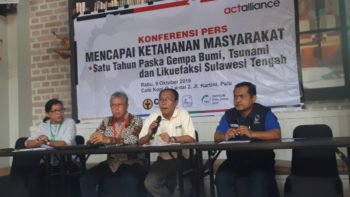
One year has passed since several regions in Central Sulawesi were affected by an earthquake with a magnitude of 7.4 on the Richter Scale that triggered tsunamis and liquefaction, especially in Palu City, Sigi Regency and Donggala Regency. The emergency disaster relief phase was immediately issued with priority to provide basic living assistance for survivors, such as interventions for managing emergency shelters, fulfilling clean water needs, cleaning and sanitation equipment, improving infrastructure and public services.
In a joint media conference on 9 October 2019, the three ACT Alliance members CWS (Church World Service), Pelkesi (Indonesia Christian Association for Health Services: ICAHS) and YEU (Yakkum Emergency Unit) presented an update on the results achieved and the challenges that the affected communities still face one year after the earthquake.
An impressive video gives an impression about the situation in the area and about the work of the three organisations. For more details, please find here the media releases from CWS, Pelkesi and YEU.
ACT Alliance Gender Justice LAC-CoP issues commitments to ICPD process
Through a declaration of commitments, ACT Alliance Gender Justice Community of Practice in Latin America and the Caribbean joined the call to “Accelerate the promise for the defense of the rights and freedom to decide of all people”, made by the Nairobi Summit +25, that in November 2019, review the goals of the International Conference on Population and Development – ICPD- of Cairo (1994).
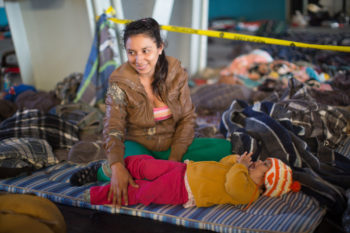
Three goals have been set by UNFPA by 2030 within the framework of the ICPD: 1) zero preventable maternal deaths, 2) zero unmet need for contraception, and 3) zero women and girls victims of violence and harmful practices.
“As churches and Faith Based Organizations (FBOs), we recognize in this framework, a key platform to promote a dignified life for all people in accordance with our Christian perspective based on the promotion of rights,” the statement reads. It was shared at the regional preparatory meeting of Nairobi + 25, held in Puebla, Mexico, on September 24-26.
“This statement was supported by a total of fifty-five churches and FBOs– ACT members and their partners– in 9 Latin American countries, which demonstrates the great will and concrete commitment of Christians in the promotion of the rights of women, girls and the LGBTIQ + population. This is a sign of hope in a regional context marked by economic, political and religious fundamentalisms that promote exclusion and inequality,” said Laura Chacón, the chair of the ACT CoP Gender Justice in LAC.
This statement is an input for the drafting of the global declaration, which ACT Alliance will take to the Nairobi Summit +25 in November, and to which other regional expressions will be added to reach these commitments that ACT Alliance endorsed through its Gender Justice Policy, which it adopted in 2017.
In the statement, Latin American and Caribbean ACT Alliance members commit themselves to develop actions to promote and strengthen strategies for pastoral action based on the dignity and rights, which prioritize prevention, detection and care of rights in cases of feminicidal violence, sexual violence, adolescent pregnancy, maternal and child mortality, as well as the promotion and defense of sexual and reproductive rights.
These commitments that aim to accelerate the fulfillment of the pending goals of the Nairobi Summit + 25, are also part of the work plan of the ACT JG CoP in LAC. Download the statement in Spanish and English.
Accompanying flood affected communities towards resilience
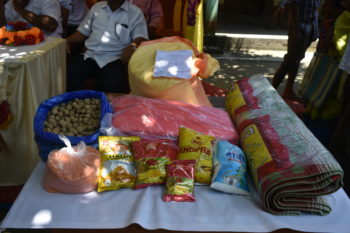
The monsoon rains in South Asia this year were overwhelming. Funded by the ACT Alliance’s Rapid Response Fund, ACT Alliance member organization CASA assists vulnerable people in India to get through this extraordinary situation.
Emergency preparedness and response planning is a key element for the ACT Alliance, a coalition of 155 churches and faith-based organisations working together in over 120 countries. But during the heavy rainfalls this year in many parts of South Asia, the ACT members in India and Bangladesh decided to submit a proposal to access ACT’s Rapid Response Fund. While CASA responded to the needs of the communities in India that were affected, the other members of the ACT India Forum engaged in emergency advocacy.
Searching for a way back to normal life
ACT Alliance’s members support the most vulnerable people in any crisis-affected community. People like Yamuna Kumari[1] for instance, a young woman from Bihar in eastern India. She was expected to give birth in just 15 days, and had lost all hope. Her house in a small village in Bihar where she lived with her children was flooded. All the major rivers had broken their embankments. Dozens of villages were inundated which forced people to flee their homes and seek shelter at safer places. Yamuna was also worried about her other children’s health. Luckily, she and her children were rescued in time and brought to a temporary shelter in a relief camp where CASA provides food.
”My house is in complete ruins; my children had no water or food and I am still not physically strong after the birth of my child. On top of that the heavy rains and flooding added to my misery“, the young woman says about the past weeks. Yamuna realized only after her evacuation that she hadn’t taken any personal belongings with her. “During such a period, there is always a sanitation, food and water crisis. Now at least I’m assured that my children are regularly being given nutritious meals. The relief material provided by CASA will sustain my family’s needs”, she states.
Daily wage earners are among the worst hit
Daily wage earners like Yamuna who already work on a meagre daily income and do not have any savings cannot earn anything at all due to the floods. What they earn is barely enough in best of circumstances to cover the basic needs, and they do not have the capacity to absorb adverse situations where their income is disrupted by natural calamities.
Being an agrarian economy, the majority of the inhabitants in the affected areas depend on farming for their livelihood. The agricultural lands have been completely inundated by the floods. In this situation, the additional support of lentils, rice, oil, tarpaulin sheets and cooking utensils distributed by CASA strengthens the ability of the people affected to overcome the situation. Moreover, ACT Alliance members consider generating awareness on health and sanitation issues which arrive after such disasters as just as important.
Thinking on a long term
Support from the ACT Alliance through its membership does not stop at providing immediate humanitarian aid. ACT is committed to building the resilience of communities, including Yamuna’s, through strengthening local capacity on Disaster Risk Reduction and the engagement of communities in Disaster Risk Mitigation.
More and more humanitarian catastrophes like the floods in India are related to climate change. Besides humanitarian action and enhancing the resilience of communities, ACT Alliance’s programme also includes advocacy and mobilisation for climate justice with a specific focus on the implementation of the Paris Agreement on Climate Change. “All countries must contribute to the global transition towards a low-carbon economy, reducing dependence on fossil fuels while delivering poverty reduction, and working with forest communities to conserve forests”, says Isaiah Toroitich, ACT Alliance’s Head of Advocacy and Development Policy.
Ensuring basic needs
By the end August 2019, a total of 1.88 million people had been displaced in India because of monsoon rains causing landslides and flooding in 11 states. The government reported 1,149 fatalities.
In 25 villages of Barpeta District in Assam, CASA’s two-month programme through the ACT Alliance Rapid Response Fund has targeted 3500 flood affected persons. Dry rations help meet families’ basic nourishment needs. People received rice, lentils, oil, turmeric powder, chilli powder and salt as well as tarpaulins and ground sheets.
Further to this, CASA extended support to around 1750 families in the flood affected districts of Madhubani in Bihar, Sanghli and Kolhapur in Maharashtra as well as Malapuram and Pathanamthitta in Kerala through its partners.
[1] Name changed for her safety
[UNGA BLOG]: Adaptation is as important as mitigation
The UN Summit must amount to more than just another stop in the climate negotiations circuit. It must help to close the ambition gap in reducing emissions, scaling-up climate finance, and addressing climate impacts.
This year, another record was broken. Sadly, it was a temperature record. July 2019 was the hottest month in recorded history. Across Europe, temperatures were recorded at an all-time high, which reportedly was made up to “100 times more likely” by climate change. The scale of the impact of Hurricane Dorian is unprecedented, costing countless lives, lost livelihoods and could cost $7 Billion in damages. It is highlighting that resilience to climate change is nowhere where it needs to be.
The globalised nature of climate change makes tackling this challenge a global necessity. Many developing countries in the Global South are now experiencing severe loss and damage (climate impacts that cannot be adapted to), despite having contributed the least to climate change. Their capacity to mitigate and adapt to climate change is slowly waning, and the evolving nature of their situation is becoming dire as they experience more and more extreme hurricanes, cyclones and droughts.
What’s clear is that if developing countries are to be able to address, minimise and avert climate change impacts, they will need support from their developed country allies. That support must come in the form of finance and capacity building and must empower communities to become more resilient.
Resources for developing countries to adapt are at an all-time low, as evidenced in the findings of the Global Commission on Adaptation that concludes that there is a severe lack of funding for adaptation.
Developing countries need their developed country allies to stand in solidarity with them. All developed countries need to scale-up and commit to predictable, grants-based climate finance for developing countries, thereby improving developing countries’ ability to engage in long-term recovery and development after climate impacts.
Developed countries, including the EU and the Member States, must act urgently to scale-up climate finance for adaptation and loss & damage. Financing for mitigation cannot be the only priority anymore. The evidence is clear- adapting to climate change is just as important as mitigating it. Pursuing this will give developing countries an opportunity to create long-term frameworks and to plan for and address climate risks in the context of sustainable development.
The world needs all countries to take bold action to address, avert and minimise climate impacts to put an end to the widespread suffering and loss that communities are facing.
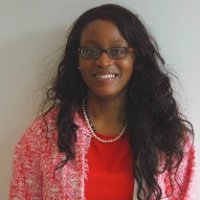
Blog by Leia Achampong, Climate Justice Policy Officer at ACT Alliance EU
As Climate Summit begins, Churches call for action now!
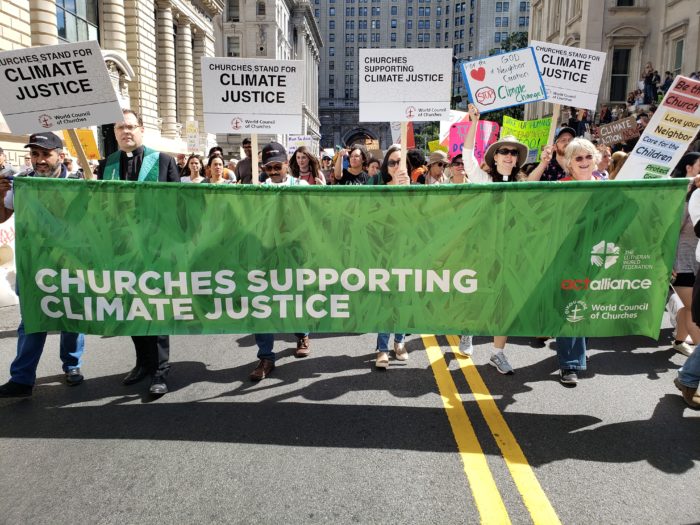
As states gather at the United Nations for the Climate Action Summit, taking place on 23 September, the ACT Alliance, Lutheran World Federation and World Council of Churches, which together represent 580 million Christians globally, are strengthening their collective call for climate justice and immediate action.
As we focus on the interconnectedness of God’s creation, our churches are urging governments worldwide to take stronger measures and present concrete plans to address climate change – now.
The world is facing the impacts of climate change at an increasing pace, escalating humanitarian needs, and leading to economic free-fall and trauma borne of violent natural disasters: Hurricane Dorian, Cyclone Idai, the Amazon fires, flooding in India, Bangladesh and Myanmar, drought in the Horn of Africa. There will be “a next disaster,” and the most vulnerable people—those who have done the least to contribute to climate change—are likely to face the brunt of its impact.
As people of faith, we call on the nations gathered at this summit to act ambitiously to address the impact of climate change, and to work with renewed vigor to keep global temperature rise below 1.5C. The time to act is now. Our care for God’s creation cannot afford more delay.
We shall do our part.
We call on our member churches, organizations, and communities to rise to this most important challenge of our time. We stand united against divisive forces that seek to negate scientific facts and silence the voices of women, of youth, of indigenous people and others who stand to lose everything as climate change ravages their lives and livelihoods.
We stand with the most vulnerable.
We call especially for action by developed nations to increase their ambition in meeting emissions targets, in providing financing, and in focusing on adaptation and mitigation for those most affected by climate change.
Climate change has become a climate emergency.
Deep-seated transformation must happen now.
[UNGA Blog] Biodiversity as God’s Blessing
The Season of Creation is an annual celebration of prayer and action to care and protect Creation. The theme this year, “Web of Life: biodiversity as God’s blessings,” allows us to meditate on two essential components of creation: it comes from God and we play a part in it.
“God said, this is a sign of the covenant which I am making between Me and you and every living creature that is with you, for all successive generations; I set My bow in the cloud, and it shall be a sign of a covenant between Me and the Earth” (Genesis 9:12-13).
The book of Genesis begins with God’s affirmation that all of creation is “very good’’ (Genesis 1:30). We are part of a complex, delicate and interdependent web of life which is valuable because it is created, sustained and redeemed by God.
Humanity is called to reflect on God’s image within the community of fellow creatures. In the New Testament, we learn that all things were created by Christ, giving particular value to each creature (Colossians 1:15-20). God’s ultimate purpose from creation to re-creation encompasses all that we call biodiversity.
The biblical witness is that the web of life – biodiversity, matters because human well-being depends on stable and thriving ecosystems and services: from clean water and food to oxygen, clothing and climate regulatory services, amongst other resources we use from nature. Biodiversity matters because God gives value to every creature that is created, yet today, human behaviour is destroying the fabric of God’s creation at an unprecedented rate.
Biodiversity matters because all of God’s creatures have value. The loss of biodiversity is an issue of justice because it is the poor and marginalized who directly depend on the health of ecosystems and are most severely affected by the collapse of the natural systems that sustain all life. Billions of people today face the loss of productive soils, clean water, forests, fish and coral reefs, and biodiversity loss is a major driver of human migration.
More information on Season of Creation 2019 is available here.
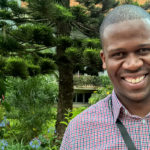 Blog by Arnold Ambundo, ACT Alliance, Climate Justice Project Coordinator.
Blog by Arnold Ambundo, ACT Alliance, Climate Justice Project Coordinator.
ACT joins human rights leaders in a pledge to tackle climate change
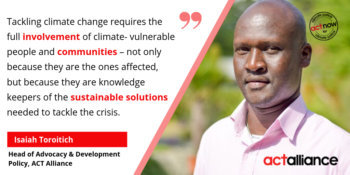 ACT Alliance has signed onto a landmark declaration alongside over 200 representatives from grassroots networks, environmental, and human rights groups, calling on governments and corporations to tackle the climate crisis.
ACT Alliance has signed onto a landmark declaration alongside over 200 representatives from grassroots networks, environmental, and human rights groups, calling on governments and corporations to tackle the climate crisis.
The declaration was adopted at the first-ever Peoples’ Summit on Climate, Rights and Human Survival (18- 19 September). The Declaration highlights the threat that climate change poses on human survival, the environment, and on the enjoyment of human rights for current and future generations.
A part of the declaration reads:
We envisage a world where people thrive as part of nature and where human rights –including the rights of Indigenous Peoples – and the environment come before corporate profit, in an era in which people are more connected with each other and with the planet.
We want to live in safe, equal, peaceful and just societies. In societies where every individual and all communities enjoy fair, secure and sustainable livelihoods; participate in decision-making on matters that affect their lives, and have access to information and justice.
“Tackling climate change requires the full involvement of climate-vulnerable people and communities – not only because they are the most affected, but because they are knowledge keepers of the sustainable solutions needed to tackle the crisis,” says Isaiah Toroitich, ACT’s Head of Advocacy and Development Policy.
As a signatory of the declaration, ACT Alliance pledges to strengthen its efforts to ensure that human rights remain at the core of climate activism.
ACT Alliance participated in the Peoples’ Summit which took place ahead of the United Nations Secretary General’s Climate Action Summit. The Summit was organized by the United Nations Human Rights Office, Greenpeace International, Amnesty International, Center for International Environmental Law, Wallace Global Fund, and the New York University School of Law Center for Human Rights and Global Justice.
The full Declaration is available here
In Central Sulawesi the resilience of the people was not buried with their homes
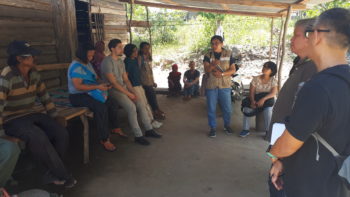 Michael Yudha
Michael Yudha
Church World Service’s Leslie Wilson looks very energetic. Together with dozens of other elderly people, she dances and smiles to the rhythm set by the gymnastic instructor, Stevany, a Pelkesi nurse. These dancing seniors welcomed the ACT Alliance Joint Monitoring Visit (JMV) team who arrived in Simoro, Sigi Regency, on Tuesday, September 3, 2019.
Besides Simoro, Pelkesi has also served the community of Tuva since the Central Sulawesi earthquake struck the Sigi Regency area in September 2018.
ACT Alliance members Pelkesi (Indonesian Christian Association for Health Service; ICAHS), CWS (Church World Service) and YEU (Yakkum Emergency Unit) provided humanitarian assistance to the area through the ACT Appeal.
Pelkesi’s Health Service and DRR
The JMV team tasted jamu, a medicinal herbal drink made by the Pelkesi health unit. On the many display tables that the villagers prepared there were various local chips and jamu. All of these products are the work of the Simoro Village women’s group.
“We chose jamu as a healthy drink because of its nutritional and vitamin value. We provide training for the elderly and women in this village. Herbal ingredients are easy to get around here and they can also be planted by the locals, if need be,” said Megawaty, a village midwife, smiling sweetly. She has served in Simoro for 3 years. Pelkesi recruited her as a health officer after the earthquake.
After tasting jamu and taking part in the dancing, the JMV team participated in a group discussion. Villagers were divided into three groups: village administrators and officials, the elderly, and health officers.
Although the services here focus on health promoting activities, Pelkesi also gives special attention to disaster risk reduction strategies. Villagers received first aid training, participated in simulations and received information on supplementary feeding (PMT) for babies. “After getting disaster training from Pelkesi, we realized the importance of prioritizing disaster risk reduction. We strongly support these efforts and therefore we budgeted first aid, simulation and PMT training activities in the village action,” exlained Hery Pampow, mayor of Simoro.
Pampow then invited the JMV team members to each plant a tree in the village educational forest. “This place is used as an education forest where the community and children can learn about the functions of forests, the types of plants, their benefits and how to prevent potential erosion and landslides in the area around the village,” Hery Pampow said with pride.
CWS Shelter
The next day, the JMV team visited the Church World Service shelter in the Sidera region.
Michael Koeniger, Country Director Indonesia & Timor-Leste, Church World Service, said that he was impressed with the participation and openness of the residents, who strongly supported the implementation of the shelter project so that it could be completed on time. “Shelter is a basic aid needed for a better recovery after a disaster. We hope that the use of this shelter can further motivate affected residents to work for to a better future, “said Koeniger in his opening remarks.
“Currently CWS is still distributing clean water while waiting for the well construction to be completed.” Said Beno Peuru, CWS Operational Manager. Together with Beno and Michael, the JMV team inspected the drilling well site. The sound of diesel engines and drills is loud. From the here, you can see the Gawalise mountains extending like a giant fortress that encloses Palu bay.
Life in internally displaced people’s camps after a disaster is hard. However, after getting shelter assistance and moving to more permanent houses, the affected residents feel safer. “Our children now look more cheerful. They like to play in groups because our houses are built close together. We feel safer and more comfortable living here,” said Mrs. Dorce while sitting with the JMV team in a circle on her house mat floor.
“We want to start farming again soon: planting corn, pepper and vegetables. If the well is ready by spring, we can use it to irrigate the agricultural land around this house,” Yohanes Rombe said.
YEU for Disability and Psychosocial
On day three, the JMV team arrived at Sudirman’s newly built home. Sudirman has lived in Ngatabaru since he was born. Unfortunately he has been paralyzed from the waist down for five years. “I am grateful and thankful to YEU for providing permanent housing assistance. If not, I would still be living in a temporary barrack,” Sudirman explained.
There are two disabled people in Ngatabaru who received permanent housing assistance from YEU. The artisans of Ngatabaru were involved in the construction process “YEU provides carpentry and building training to villagers. My wife and I help supervise the work and select materials used,” Sudirman continued.
A total of 50 permanent houses specifically designed for disabled people will be built by YEU in three districts; Palu, Sigi, Donggala. “The concept of the houses we build is inclusion. We provide these houses with disabled access facilities and universal toilets. Work is carried out in bulk and involves the villagers themselves.” YEU’s information and communication staff gave a brief explanation of the project to the JMV.
Before the earthquake’s devastation, Ngatabaru had plans to build drainage channels along the village’s main road. The waterways are important to prevent rainwater overflows and protect the road body from erosion. However, the plan had to be canceled to prioritize post-earthquake emergency response activities.
The village of Bangga experienced a worse fate. Many houses had already been destroyed by the earthquake, flash floods destroyed Bangga completely. More than 400 families were forced to live in internally displaced camps because their houses were levelled by massive flash floods in April 2019.
“Many of our residents are stressed. Two people committed suicide,” said Dewi, the head of the RT (Rukun Tetangga; groups of household) in Bangga.
“YEU provides psychosocial services anddisaster risk reduction training. We have a map of threats and vulnerabilities but it’s not enough. We need capital for business or work. Our village can no longer be inhabited and we must join the relocation programme from the government,” Dewi said quickly and straightforwardly.
From the results of discussions between the JMV team and a number of Bangga residents, it appears that a number of humanitarian organizations have carried out emergency responses in various forms, from WASH facilities, tents, cash assistance to health and psychosocial services.
“After a disaster, it is better to immediately coordinate between the aid agencies and the local government, then create a service intervention matrix. This way we can systematically map the needs and the assistance provided.,” advised Leslie Wilson. A number of residents and the Bangga government officials welcomed Leslie’s suggestion. “Yes, that should be the case. The support of NGOs is crucial and much needed to show the government the gaps we are facing. The government has frequently conducted surveys and data collection, but we haven’t seen practical results,” said Jaya, Head of Bangga development section.
After visiting Pelkesi, CWS and YEU projects, the JMV team held a coordination meeting and shared their findings. “There has been a lot of progress, but much more needs to be done. I think livelihoods are also a major problem that we must pay attention to,” Leslie Wilson said.
She was very impressed with the spirit of life and optimism shown by the residents of Bangga. Despite the repeated disasters, the resilience of the people was not buried with their homes.